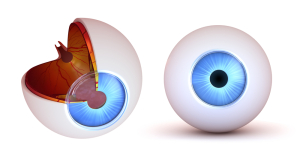We treat eye injuries at our Lincoln location
What happens when a patient suffers an eye injury or trauma?
Any physical injury or physical trauma obtained by the eyes can quickly escalate to more serious conditions that may threaten the patient’s vision if they are not given immediate medical attention. If you feel that your eye has been damaged, you should contact Dr. Forgey in Nebraska immediately to be examined. It is often perceived that the immediate signs that the eyes have sustained injury or trauma is when they appear to be red, inflamed, or when the patient complains of pain on the affected eye. Light sensitivity and blurred vision are also some of the symptoms that doctors look out for when identifying possible eye injury or eye trauma. The eyes are generally very susceptible to trauma because of their positions on the patient’s face. Any type of situation that could potentially cause head or facial trauma also poses the possibility of causing eye injury or trauma.
 What are the different types of eye injury?
What are the different types of eye injury?
The classifications of eye injury vary greatly depending on the severity of the condition. It could be something as minor as the irritation you feel when you get sand in your eyes, or a serious penetrating injury that could lead to permanent loss of vision.
- Corneal abrasions usually involves scratches on the surface of the eye when it gets poked or rubbed in the presence of a foreign body such as sand, dust, or other types of small particles. This type of eye injury is a great source of discomfort and often causes redness and light sensitivity. Urgent care is needed to treat this type of injury so as to prevent infection or more serious complications.
- Non-penetrating trauma or a closed globe injury is a type of eye injury that signifies that the eyeball is intact, but has been affected by blunt force trauma.
- Penetrating traumas affect the integrity of the eyeball because of the presence of a wound that punctures the orbit of the eye, and it may also result in the prolapse of the affected eye. Immediate medical attention is required for these types of injuries, and it is also advisable to refrain from removing the penetrating object so that further injury is avoided.
- Blunt trauma can cause swollen eyes. A cold compress can usually alleviate the most immediate symptoms of blunt trauma, but getting medical advice regarding this type of injury is also useful to ensure that there was no internal damage inflicted on the eye.
- Orbital blowout fractures are characterized by cracks in the bones surrounding the orbit of the eye.
- A hyphema is typically the bleeding of the chamber at the back of the eye, or the space in between the iris and the cornea.
- Perforating injuries are very serious and mean that the eye has been damaged in two locations, particularly at the spots Where the foreign body has entered and exited.
- Chemical exposure can burn your eyes and cause extensive damage when left untreated. Acid burns can usually be washed out where the water, but alkali exposure may cause more serious damage to the eyes and should be brought to the attention of a medical professional as soon as possible.
- Traumatic iritis is inflammation of the iris after the patient has sustained an eye injury. Any type of force or a blow that is delivered onto the eye can cause this condition, which requires medical attention.
What should I do when I get an eye injury?
Dr. Dean Forgey advises his patients that it is always best to get immediate medical attention for any injury or trauma concerning the eyes. If the injury involves any foreign body penetrating the eyes, do not attempt to remove the perforating object yourself. Doing this may cause more damage, and could potentially impair your vision permanently. As soon as you get to a doctor, mention the circumstances surrounding your eye injury, whether you wear contact lenses or not, and what first aide steps you me already have taken. Remember to treat any type of eye injury as an emergency and do not hesitate to seek immediate medical attention to resolve the condition.
What can I do to prevent eye injuries?
Reducing the risk of getting an eye injury can’t be achieved by taking certain precautionary measures when going about your daily activities. Wearing appropriate protective eyewear when engaged in tasks that could potentially harm your eyes is a good way to prevent unfortunate accidents. Good-quality sunglasses also come highly recommended for protecting your eyes from excessive glare and harmful ultraviolet radiation. Additionally, knowing what components are in your household products can go a long way in preventing eye injuries because this can help people have an idea of how to properly handle these chemicals without posing any potential health hazards.

